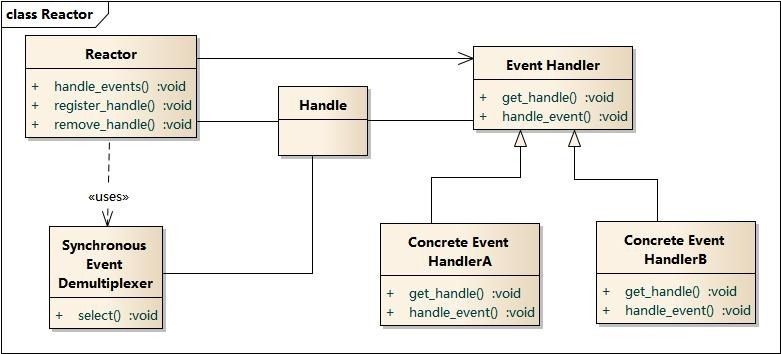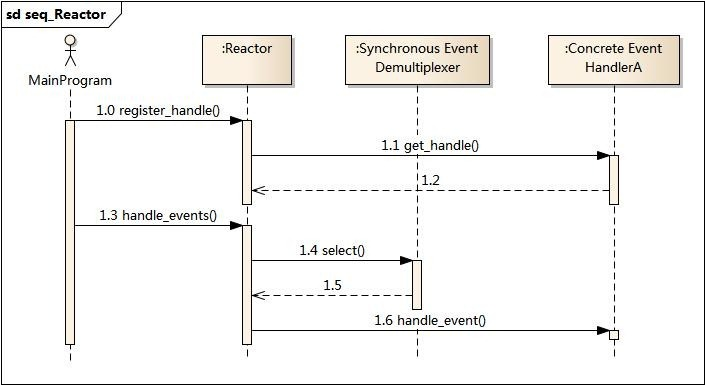Reactor模式:

Reactor包含如下角色:
- Handle 句柄;用来标识socket连接或是打开文件;
- Synchronous Event Demultiplexer:同步事件多路分解器:由操作系统内核实现的一个函数;用于阻塞等待发生在句柄集合上的一个或多个事件;(如select/epoll;)
- Event Handler:事件处理接口
- Concrete Event HandlerA:实现应用程序所提供的特定事件处理逻辑;
- Reactor:反应器,定义一个接口,实现以下功能:
1)供应用程序注册和删除关注的事件句柄;
2)运行事件循环;
3)有就绪事件到来时,分发事件到之前注册的回调函数上处理;
业务流程及时序图:

- 应用启动,将关注的事件handle注册到Reactor中;
- 调用Reactor,进入无限事件循环,等待注册的事件到来;
- 事件到来,select返回,Reactor将事件分发到之前注册的回调函数中处理;
转自:https://segmentfault.com/a/1190000002715832
channel类:
///channel类的作用是把不同的IO事件分发给不同的回调函数,(一个fd上可以支持监听多个IO事件类型) ///每个channel对象只属于一个EventLoop ///每个channel对象只负责一个文件描述符fd的IO事件分发 ///channel就像是一个容器,管理fd到callback的映射,当活动事件来临时,分发事件给不同的callback ///channel对象负责的fd const int fd_; //channel关心的IO事件,有三种事件类型:kNoneEvent kReadEvent kWriteEvent,定义在channel.cc中,由enableReading disableReading enableWriting disableWriting等函数来设置 int events_; //目前活动的事件,由poller设置 int revents_; // it's the received event types of epoll or poll
//从shared_ptr对象obj构造weak_ptr tie_,获得资源的观测权 //防止shared_ptr出现循环引用 void Channel::tie(const boost::shared_ptr<void>& obj) { tie_ = obj; tied_ = true; } //handleEvent是channel的核心,由EventLoop::loop()通过channel对象调用,然后该函数根据revents_的值分别调用不同的用户回调 void Channel::handleEvent(Timestamp receiveTime) { boost::shared_ptr<void> guard; if (tied_) { //lock从被观测的shared_ptr获得一个可用的shared_ptr对象,从而操作资源 guard = tie_.lock(); if (guard) { handleEventWithGuard(receiveTime); } } else { handleEventWithGuard(receiveTime); } } //根据revents_的值(目前活动的事件)分别调用不同的用户回调,也就是说channel对象处理fd上各种类型的事件,与events_无关(?) void Channel::handleEventWithGuard(Timestamp receiveTime) { eventHandling_ = true; LOG_TRACE << reventsToString(); if ((revents_ & POLLHUP) && !(revents_ & POLLIN)) { if (logHup_) { LOG_WARN << "fd = " << fd_ << " Channel::handle_event() POLLHUP"; } if (closeCallback_) closeCallback_(); } if (revents_ & POLLNVAL) { LOG_WARN << "fd = " << fd_ << " Channel::handle_event() POLLNVAL"; } if (revents_ & (POLLERR | POLLNVAL)) { if (errorCallback_) errorCallback_(); } if (revents_ & (POLLIN | POLLPRI | POLLRDHUP)) { if (readCallback_) readCallback_(receiveTime); } if (revents_ & POLLOUT) { if (writeCallback_) writeCallback_(); } eventHandling_ = false; }
poller类:
///fd到channel*的映射 typedef std::map<int, Channel*> ChannelMap; ///每次fd被创建时,就应该加入到channels_中 ChannelMap channels_;
poller类调用poll获得当前有活动IO事件的fd,将它对应的channel填入activeChannels.
EventLoop类:
//事件循环,该函数不能跨线程调用,只能在创建该对象的线程中调用 void EventLoop::loop() { assert(!looping_); assertInLoopThread(); looping_ = true; quit_ = false; // FIXME: what if someone calls quit() before loop() ? LOG_TRACE << "EventLoop " << this << " start looping"; while (!quit_) { activeChannels_.clear(); ///调用poll获得当前活动事件的channel列表(其实是将有活动事件的fd对应的channel填入activechannels_),然后依次调用每个channel的handleEvent函数 pollReturnTime_ = poller_->poll(kPollTimeMs, &activeChannels_); ++iteration_; if (Logger::logLevel() <= Logger::TRACE) { printActiveChannels(); } // TODO sort channel by priority eventHandling_ = true; for (ChannelList::iterator it = activeChannels_.begin(); it != activeChannels_.end(); ++it) { currentActiveChannel_ = *it; currentActiveChannel_->handleEvent(pollReturnTime_); } currentActiveChannel_ = NULL; eventHandling_ = false;
//执行等待队列中的回调函数 doPendingFunctors(); } LOG_TRACE << "EventLoop " << this << " stop looping"; looping_ = false; }
//检查当前的线程是否是所在EventLoop对象所属的线程,因为有的函数是线程安全的,有的函数不是
bool isInLoopThread() const { return threadId_ == CurrentThread::tid(); } //保证线程安全地调用函数cb
void EventLoop::runInLoop(const Functor& cb) { ///当前线程与cb所属IO线程相同,回调会同步进行 if (isInLoopThread()) { cb(); } else { ///cb被加入队列,IO线程会被唤醒来调用这个函数
queueInLoop(cb); } } void EventLoop::queueInLoop(const Functor& cb) { { MutexLockGuard lock(mutex_); pendingFunctors_.push_back(cb); } //调用queueInLoop的线程不是IO线程或者IO线程正在调用doPendingFunctors,此时需要唤醒IO线程(指的是当前loop循环结束后,不要阻塞在poll循环处,而是立即从poll函数调用返回)
//调用queueInLoop的线程不是当前IO线程则需要唤醒当前线程,才能及时执行doPendingFunctors
//doPendingFunctors调用的Functor可能又添加了任务,故循环回去poll的时候需要被唤醒,进而继续执行doPendingFunctors(),否则这些新加的cb就不能被及时调用.若不唤醒,只有等监听的fd有活动事件的时候,才会继续执行
//只有在handleEvent()中调用queueInLoop不需要唤醒,因为接下来马上就会执行doPendingFunctors() if (!isInLoopThread() || callingPendingFunctors_) { wakeup(); } }
//该函数只会被当前IO线程调用,依次执行队列中的函数 void EventLoop::doPendingFunctors() { std::vector<Functor> functors; callingPendingFunctors_ = true; { MutexLockGuard lock(mutex_); functors.swap(pendingFunctors_); } for (size_t i = 0; i < functors.size(); ++i) { functors[i](); } callingPendingFunctors_ = false; }
IO线程平时阻塞在事件循环EventLoop::loop()的poll调用中,为了让IO线程能立刻执行用户回调,需要唤醒它。传统的方法是使用管道pipe,IO线程始终监视此管道的readable事件,在需要唤醒的时候,其他线程往管道里写一个字节,这样IO线程就从IO 多路复用阻塞调用中返回。linux中使用eventfd,可以更高效地唤醒,因为它不必管理缓冲区。
eventfd 是一个比 pipe 更高效的线程间事件通知机制,一方面它比 pipe 少用一个 file descripor,节省了资源;另一方面,eventfd 的缓冲区管理也简单得多,全部“buffer” 只有定长8 bytes,不像 pipe 那样可能有不定长的真正 buffer。
http://blog.csdn.net/solstice/article/details/6171831
//wakeupFd_是eventfd, int wakeupFd_; //wakeupChannel_处理wakeupFd上的readable事件,将事件分发至handleRead函数 boost::scoped_ptr<Channel> wakeupChannel_;
http://blog.csdn.net/NK_test/article/details/51138359
http://blog.csdn.net/yusiguyuan/article/details/40593721?utm_source=tuicool&utm_medium=referral
http://dirtysalt.info/muduo.html
EventLoopThread类:
IO线程不一定是主线程,我们可以在任何一个线程创建并运行EventLoop,一个程序也可以有不止一个IO线程.EventLoopThread会启动自己的线程,并在其中运行EventLoop:loop(),用条件变量来等待线程的创建和运行.
EventLoop* EventLoopThread::startLoop() { assert(!thread_.started()); thread_.start(); { MutexLockGuard lock(mutex_); while (loop_ == NULL) { cond_.wait(); } } return loop_; } //线程主函数 void EventLoopThread::threadFunc() { EventLoop loop; if (callback_) { callback_(&loop); } { MutexLockGuard lock(mutex_); loop_ = &loop; //唤醒startLoop() cond_.notify(); } loop.loop(); //assert(exiting_); loop_ = NULL; }
条件变量:http://blog.jobbole.com/44409/
http://blog.csdn.net/liuxuejiang158blog/article/details/16554023 这个例子要看一下